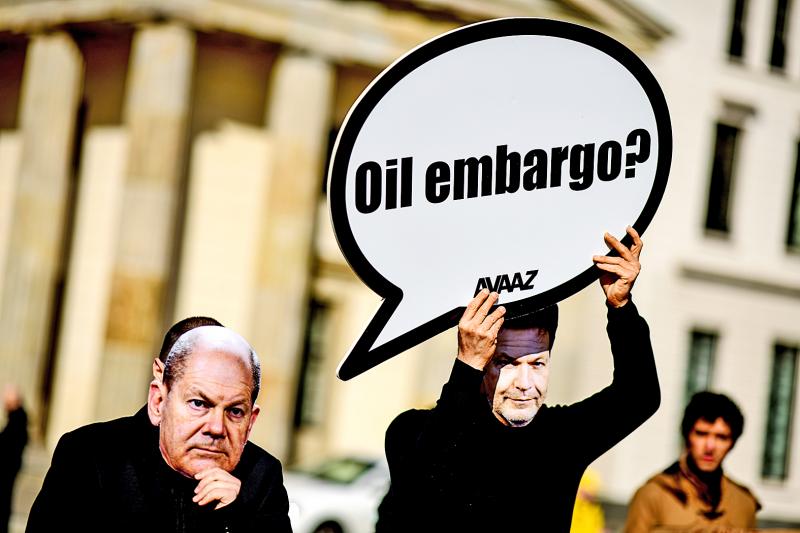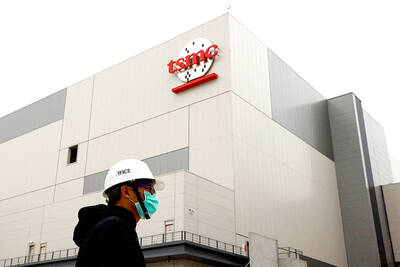Oil on Friday closed at a six-week high on signs that the market is tightening, as members of the EU moved closer toward banning Russian crude.
West Texas Intermediate for June delivery rose 1.39 percent to US$109.77 a barrel, up 4.85 percent on the week and its first back-to-back weekly gain in two months.
Brent crude for July delivery increased 4.85 percent to US$112.39 a barrel, gaining 2.79 percent from a week earlier.

Photo: AP
The EU intends to ban Russian crude in six months and oil products by the end of the year to punish Moscow for its war on Ukraine.
The bloc has proposed giving Hungary — which has pushed back against an embargo — and Slovakia an extra year to comply, people familiar with the matter said on Friday.
“Crude prices just want to head higher as energy traders completely fixate over the looming European sanctions on Russian oil,” Oanda Corp senior market analyst Edward Moya said. “No one wants to be on the wrong side of a major crude supply disruption headline, so whatever oil price dips that happen will be short-lived.”
The US government on Thursday said that it would begin buying crude to replenish the nation’s reserve.
While the process could begin in the fall, actual deliveries would not take place until later.
Oil has rallied more than 40 percent this year as the invasion of Ukraine upended commodity markets.
This week’s advance — the third in the past four — has come despite lingering concerns that lockdowns in China to combat COVID-19 outbreaks are hurting consumption.
“Chinese oil demand has been down 1.5 million barrels per day,” due to the lockdowns, S&P Global Inc vice chairman Dan Yergin said.
Yet knowing China’s ways, it is expected to stage a strong rebound and that would affect all commodity prices, he added.
This week, OPEC and its allies did announce another modest increase in supply, but there is doubt the alliance will be able to deliver the full volume.
Oil-product markets have also shown signs of strength this week, especially in the US, where nationwide holdings of gasoline and diesel have dropped. Gasoline futures are trading near a record high after a weekly gain of about 6 percent.
Additional reporting by staff writer

Stephen Garrett, a 27-year-old graduate student, always thought he would study in China, but first the country’s restrictive COVID-19 policies made it nearly impossible and now he has other concerns. The cost is one deterrent, but Garrett is more worried about restrictions on academic freedom and the personal risk of being stranded in China. He is not alone. Only about 700 American students are studying at Chinese universities, down from a peak of nearly 25,000 a decade ago, while there are nearly 300,000 Chinese students at US schools. Some young Americans are discouraged from investing their time in China by what they see

Taiwan Semiconductor Manufacturing Co (TSMC, 台積電), the world’s largest contract chipmaker, yesterday reported record sales for the first quarter, which analysts attributed to solid demand for emerging technologies. Consolidated revenue totaled NT$592.64 billion (US$18.51 billion) in the January-to-March period, up 16.5 percent from a year earlier, but down 5.26 percent from the previous quarter, TSMC said in a statement. The first-quarter revenue beat analysts’ average projection of NT$579.5 billion, Bloomberg News reported. That performance lends weight to expectations that the world’s most valuable chipmaker would return to solid growth this year after weathering a post-COVID-19-pandemic cratering of smartphone and computer sales. TSMC is budgeting

HUALIEN BRANCH: The company had been planning to rebuild the hotel before it was damaged in the quake and vowed to give affected employees the option to transfer The owner of Chateau de Chine Hualien (花蓮翰品酒店) is planning to lay off 86 workers after shutting down the hotel due to damage it sustained in a powerful earthquake on Wednesday last week, the Ministry of Labor said yesterday. The hotel has submitted a layoff report to the Hualien County Government and expects to let 69 workers go this month and 17 next month, the ministry said. LDC Hotels & Resorts Group (雲朗觀光集團), the owner of Chateau de Chine Hualien, confirmed the layoff plan in a statement yesterday. LDC said the hotel has been closed since Wednesday last week when the temblor occurred

US CONSCULTANT: The US Department of Commerce’s Ursula Burns is a rarely seen US government consultant to be put forward to sit on the board, nominated as an independent director Taiwan Semiconductor Manufacturing Co (TSMC, 台積電), the world’s largest contract chipmaker, yesterday nominated 10 candidates for its new board of directors, including Ursula Burns from the US Department of Commerce. It is rare that TSMC has nominated a US government consultant to sit on its board. Burns was nominated as one of seven independent directors. She is vice chair of the department’s Advisory Council on Supply Chain Competitiveness. Burns is to stand for election at TSMC’s annual shareholders’ meeting on June 4 along with the rest of the candidates. TSMC chairman Mark Liu (劉德音) was not on the list after in December last